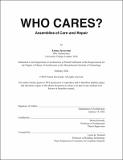Who Cares? Assemblies of Care-and-Repair
Author(s)
Jurczynski, Emma
DownloadThesis PDF (155.2Mb)
Advisor
Kennedy, Sheila
Terms of use
Metadata
Show full item recordAbstract
We source, process and build with standardized wood and, just as easily, discard it. Rubbish, scraps, the wasted, the junked are assumed to be undesirable due to a lack of knowledge about the structural capacity of second-hand timber. Deemed unusable, approximately 36 million tons of dimensional lumber and plywood end up in U.S. landfills because few people know what to do with it and there is nowhere to store it.
This thesis presents a methodology that reuses these construction materials through a system of assemblage that maximizes the amount used, and catalogues these materials in a prototypical storage warehouse that not only stores discarded standard timber but is itself built from it. The more material used, the less sequestered carbon dioxide is released into the atmosphere. I am taking an excessive approach to use as much leftover wood as possible to be inefficiently efficient.
This methodology is a care-and-repair system that re-assigns value and extends the lifespan of used materials. In this instance, repair means returning a material to its original function, not form. Repair is an act of assembling layers of material from multiple sites and environments with inherent histories and memories from various moments and places.
With the planet in need of “critical care”, this method is proposed as a necessary near-future reality in order to minimize our footprint and carbon emissions. The proposed act of caring towards our materials creates a culture of inefficient construction systems and celebrates the social and environmental efficiencies that grows from it.
Date issued
2022-02Department
Massachusetts Institute of Technology. Department of ArchitecturePublisher
Massachusetts Institute of Technology